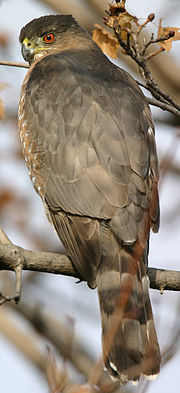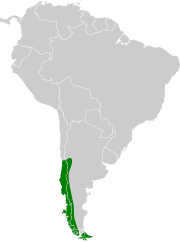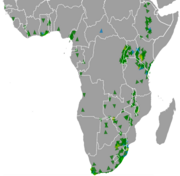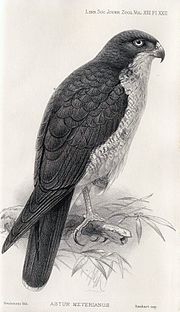Accipiter
| Accipiter | |
|---|---|

| |
| Collared sparrowhawk, Kobble Creek (Queensland, Australia) | |
| Scientific classification | |
| Domain: | Eukaryota |
| Kingdom: | Animalia |
| Phylum: | Chordata |
| Class: | Aves |
| Order: | Accipitriformes |
| Family: | Accipitridae |
| Subfamily: | Accipitrinae |
| Genus: | Accipiter Brisson, 1760 |
| Type species | |
| Falco nisus[1] Linnaeus, 1758
| |
| Synonyms | |
|
Hieraspiza Kaup, 1844 (but see text) | |
Accipiter (/ækˈsɪpədər/) is a genus of birds of prey in the family Accipitridae. With around 50 recognized species it is the most diverse genus in its family. Most species are called goshawks or sparrowhawks, although with the exception of the American goshawk almost all New World species are simply known as "hawks". They can be anatomically distinguished from their relatives by the lack of a procoracoid foramen. Two small and aberrant species usually placed here do possess a large procoracoid foramen and are also distinct as regards DNA sequence. They may warrant separation in the old genus Hieraspiza.[2]
Extant accipiters range in size from the little sparrowhawk (A. minullus), in which the smallest males measure 20 cm (7.9 in) long, span 39 cm (15 in) across the wings and weigh 68 g (2.4 oz), to the northern goshawk (A. gentilis), in which the largest females measure 64 cm (25 in) long, span 127 cm (50 in) across the wings, and weigh 2.2 kg (4.9 lb).[3] These birds are slender with short, broad, rounded wings and a long tail which helps them maneuver in flight. They have long legs and long, sharp talons used to kill their prey, and a sharp, hooked bill used in feeding. Females tend to be larger than males. They often ambush their prey, mainly small birds and mammals, capturing them after a short chase. The typical flight pattern is a series of flaps followed by a short glide. They are commonly found in wooded or shrubby areas.
The genus Accipiter was introduced by the French zoologist Mathurin Jacques Brisson in 1760.[4] The type species is the Eurasian sparrowhawk (Accipiter nisus).[5] The name is Latin for "hawk", from accipere, "to grasp".[6]
Procoracoid foramen
[edit]The procoracoid foramen (or coracoid foramen, coracoid fenestra) is a hole through the process at the front of the coracoid bone, which accommodates the supracoracoideus nerve. In some groups of birds it may be present as a notch, or incisura; or the notch may be partially or weakly closed with bone. In other groups the feature is completely absent.
The foramen is generally present in birds of prey, but it is absent in most Accipiter hawks that have been studied. This absence is proposed as a diagnostic feature.
A study of accipitrid skeletons found procoracoid incisurae (as opposed to foramina) in some specimens of the eagles Aquila gurneyi and A. chrysaetos, but not in four other Aquila species. The notch was variably open or weakly ossified in Spizastur melanoleucos, Lophoaetus occipitalis, Spizaetus ornatus, and Stephanoaetus coronatus. Also the buteonine hawks Buteo brachyurus and B. hemilasius had incisurae, differing from 17 other Buteo species.[7]
In Circus the foramen was found to be variable, not only within species but even between sides in the same individual. It is usually open or absent but may be closed by "a thread of bone". Research in genetic phylogeny has since indicated that Circus is closely related to Accipiter.
The notch was also absent or indistinct in Harpagus bidentatus.
Urotriorchis macrourus has a well-developed procoracoid foramen, which suggests a separation from Accipiter. It may be related to the chanting goshawks in tribe Melieraxini.[8]
Genetic phylogeny
[edit]Analysis of molecular genetics indicates that Accipiter is paraphyletic to the Circus harriers, even though the two groups differ in hunting habits and body shape.[9] There are three or four clades of Accipiter, with Circus, Megatriorchis and Erythrotriorchis intermixed.
John Boyd proposes splitting Accipiter into four separate genera: Aerospiza, Tachyspiza, Accipiter, and Astur.[10] In this scheme Tachyspiza has the most species, and a reduced Accipiter would have only six: Eurasian sparrowhawk (A. nisus, type species), rufous-breasted sparrowhawk (A. rufiventris), sharp-shinned hawk (A. striatus), white-breasted hawk (A. chionogaster), plain-breasted hawk (A. ventralis), rufous-thighed hawk (A. erythronemius).
- Tribe Accipitrini
- (group 1)
- (group 2)
- Accipiter
- (group 2a)
- Megatriorchis
- Astur
- Circus
- harriers
- swamp-harriers
List of Accipiter species
[edit]There are 9 species in the Accipiter genus.[11]
Extinct species
[edit]- Powerful goshawk, Accipiter efficax[25]
- Gracile goshawk, Accipiter quartus[25]
Notes
[edit]- ^ 9 Accipiter species are listed according to the IOC World Bird List.[11] One species, Lesser Sundas goshawk, which is listed in the IUCN redlist but not the IOC World Bird List is excluded.
- ^ A binomial authority in parentheses indicates that the species was originally described in a genus other than Accipiter.
- ^ Estimate for the number of mature individuals in the wild.
References
[edit]- ^ "Accipitridae". aviansystematics.org. The Trust for Avian Systematics. Retrieved 2023-07-26.
- ^ Olson (2006)
- ^ Raptors of the World by Ferguson-Lees, Christie, Franklin, Mead & Burton. Houghton Mifflin (2001), ISBN 0-618-12762-3.
- ^ Brisson, Mathurin Jacques (1760). Ornithologie; ou, Méthode contenant la division des oiseaux en ordres, sections, genres, espéces & leurs variétés (in French). Vol. 1. Paris: Jean-Baptiste Bauche. pp. 28, 310.
- ^ Mayr, Ernst; Cottrell, G. William, eds. (1979). Check-list of Birds of the World. Volume 1. Vol. 1 (2nd ed.). Cambridge, Massachusetts: Museum of Comparative Zoology. p. 323.
- ^ Jobling, James A. (2010). The Helm Dictionary of Scientific Bird Names. London: Christopher Helm. p. 30. ISBN 978-1-4081-2501-4.
- ^ Olson, Storrs (1988). "Variation in the procoracoid foramen in the Accipitridae" (PDF). Riv. Ital. Orn. 57 (3–4): 161–164. Retrieved 18 June 2016.
- ^ Boyd, John. "Afroaves", Taxonomy in Flux Checklist
- ^ Boyd cites the following sources for the embedding of Circus: Kocum (2006), Griffiths et al. (2007), Lerner et al. (2008), and Nagy and Tökölyi (2014)
- ^ His species-level arrangement is based on: Wink and Sauer-Gürth (2004), Breman et al. (2013), Barrowclough et al. (2014), Nagy and Tökölyi (2014) and Kocum (2006)
- ^ a b Gill, Frank; Donsker, David; Rasmussen, Pamela, eds. (August 2024). "Hoatzin, New World vultures, Secretarybird, raptors". IOC World Bird List Version 14.2. International Ornithologists' Union. Retrieved 22 August 2024.
- ^ BirdLife International (2016). "Accipiter poliogaster". IUCN Red List of Threatened Species. 2016: e.T22695453A93510396. doi:10.2305/IUCN.UK.2016-3.RLTS.T22695453A93510396.en.
- ^ BirdLife International (2018). "Accipiter madagascariensis". IUCN Red List of Threatened Species. 2018: e.T22695613A129916593. doi:10.2305/IUCN.UK.2018-2.RLTS.T22695613A129916593.en.
- ^ BirdLife International (2016). "Accipiter ovampensis". IUCN Red List of Threatened Species. 2016: e.T22695619A93519626. doi:10.2305/IUCN.UK.2016-3.RLTS.T22695619A93519626.en.
- ^ BirdLife International. (2021). "Accipiter nisus". IUCN Red List of Threatened Species. 2021: e.T22695624A199751254. doi:10.2305/IUCN.UK.2021-3.RLTS.T22695624A199751254.en.
- ^ BirdLife International (2016). "Accipiter rufiventris". IUCN Red List of Threatened Species. 2016: e.T22695630A93520985. doi:10.2305/IUCN.UK.2016-3.RLTS.T22695630A93520985.en.
- ^ BirdLife International (2019). "Accipiter striatus". IUCN Red List of Threatened Species. 2019: e.T22734130A155416546. doi:10.2305/IUCN.UK.2019-3.RLTS.T22734130A155416546.en.
- ^ BirdLife International (2016). "Accipiter cooperii". IUCN Red List of Threatened Species. 2016: e.T22695656A93521264. doi:10.2305/IUCN.UK.2016-3.RLTS.T22695656A93521264.en.
- ^ BirdLife International (2017). "Accipiter gundlachi". IUCN Red List of Threatened Species. 2017: e.T22695659A112104677. doi:10.2305/IUCN.UK.2017-1.RLTS.T22695659A112104677.en.
- ^ BirdLife International (2020). "Accipiter bicolor". IUCN Red List of Threatened Species. 2020: e.T22695669A168769390. doi:10.2305/IUCN.UK.2020-3.RLTS.T22695669A168769390.en.
- ^ BirdLife International (2016). "Accipiter melanoleucus". IUCN Red List of Threatened Species. 2016: e.T22695673A93522165. doi:10.2305/IUCN.UK.2016-3.RLTS.T22695673A93522165.en.
- ^ BirdLife International. (2020). "Accipiter henstii". IUCN Red List of Threatened Species. 2020: e.T22695678A173353411. doi:10.2305/IUCN.UK.2020-3.RLTS.T22695678A173353411.en.
- ^ BirdLife International (2016). "Accipiter gentilis". IUCN Red List of Threatened Species. 2016: e.T22695683A93522852. doi:10.2305/IUCN.UK.2016-3.RLTS.T22695683A93522852.en.
- ^ BirdLife International (2016). "Accipiter meyerianus". IUCN Red List of Threatened Species. 2016: e.T22695689A93523669. doi:10.2305/IUCN.UK.2016-3.RLTS.T22695689A93523669.en.
- ^ a b Balouet, J.C.; Olson, Storrs L. (1989). "Fossil birds from Late Quaternary deposits in New Caledonia". Smithsonian Contributions to Zoology. 469 (469): 6–7. doi:10.5479/si.00810282.469. S2CID 129928825.
Further reading
[edit]- Balete, Danilo S.; Tabaranza, Blas R. Jr. & Heaney, Lawrence R. (2006): An Annotated Checklist of the Birds of Camiguin Island, Philippines. Fieldiana Zool. New Series 106: 58–72. DOI:10.3158/0015-0754(2006)106[58:AACOTB]2.0.CO;2 HTML abstract
- Heaney, Lawrence R. & Tabaranza, Blas R. Jr. (2006): Mammal and Land Bird Studies on Camiguin Island, Philippines: Background and Conservation Priorities. Fieldiana Zool. New Series 106: 1–13. DOI:10.3158/0015-0754(2006)106[1:MALBSO]2.0.CO;2 HTML abstract
- Olson, Storrs L. (2006): Reflections on the systematics of Accipiter and the genus for Falco superciliosus Linnaeus. Bull. B.O.C. 126: 69–70. PDF fulltext. Archived copy.


























